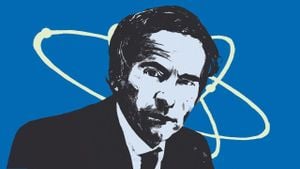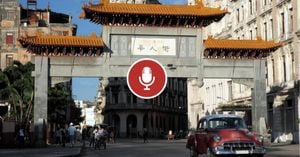Recent tensions between the United Kingdom and the United States have emerged over the contentious Chagos Islands deal, stirring debates among political leaders and shaping diplomatic conversations.
The Chagos Islands, situated in the Indian Ocean, have been at the center of a long-standing dispute between the UK and Mauritius. Following the British government's negotiation of the deal to hand the islands back to Mauritius, Stephen Doughty, the UK Foreign Office minister, emphasized the necessity of this agreement. He conveyed to MPs, 'if the UK had not negotiated this deal with Mauritius, a legally binding decision against the UK seemed inevitable.' This statement made clear the UK government’s position on the matter, indicating urgency and the high stakes involved.
Contrastingly, the Conservative Party has expressed strong opposition to the deal. Priti Patel, the former Home Secretary, has vocalized the concerns from within her party, claiming they are actively against the retrocession of the islands. This sentiment is echoed by many Conservative MPs, including notable figures such as Lord Ashcroft, who is reportedly considering offering financial support for legal actions opposing the transfer.
On the other side of the political spectrum, Labour’s leaders seem to hold differing views. They argue the importance of transparency and assertiveness on the issue, urging the government to communicate more freely about the plan. During the recent Prime Minister’s Questions (PMQs), Keir Starmer, the leader of the Labour Party, confronted Conservative officials over their stance, expressing his disapproval of how the situation has been handled.
Another layer complicates this diplomatic affair—the incoming team of Donald Trump. Reports suggest there is mixed sentiment within Trump’s team surrounding the Chagos Islands deal, with concerns raised about its potential ramifications on US-UK relations. Nigel Farage, the prominent Brexit advocate, stated there is evident 'outright hostility' from Trump’s administration toward the agreement. He cautioned of potential challenges the UK might face if the new administration chooses to take action against this deal.
Doughty reassured the Chamber of Commons, stating, when Trump's team is fully briefed about the deal, their reservations would be addressed. He remains optimistic about the future of UK-US relations, framing the newly forged deal as constructive, promoting peace and mutual respect.
Over the past few years, the Chagos Islands have symbolized the struggles of derived sovereignty. Following decades of British control, Mauritian insistence on its rightful claim has intensified. The United Nations took steps to support Mauritius's assertions, with their resolution reaffirming colonial territories’ end. This has urged conversations on decolonization and sovereignty, placing it firmly on the international political agenda.
For the Chagossians, the situation is particularly layered. Many were relocated when the UK established the U.S. military base on Diego Garcia, one of the largest islands of the group. They have long sought justice and the right to return to their homeland, leading to continued activism and calls for their rights to be recognized by both nations.
These discussions and tensions are not just about real estate; they probe the essence of colonial legacy and the rights of displaced populations. The fate of the Chagos Islands continues to reflect national pride and global justice, creating complex shadows across the increasingly important diplomatic ties between the UK and the United States.
Moving forward, the situation remains fluid as both political parties must navigate their positions. The resolution of the Chagos Islands’ negotiations will likely define the future of their relationships and provoke broader calls for accountability and justice worldwide.



